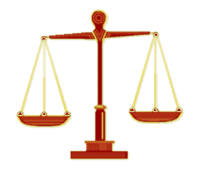Judicial nullification facts for kids
Judicial nullification is when a judge decides that a law should not be used in a specific case. This happens if the judge believes the law is too strict or unfair for that particular situation. It's like a judge saying, "This law doesn't fit here."
This idea was discussed a long time ago during the Constitutional Convention. This was when the United States Constitution was being created. Some important people, like George Mason, Elbridge Gerry, and James Wilson, thought that courts should be able to decide if a law went against the Constitution. If a law was found to be "unconstitutional," they believed judges should not have to enforce it.
However, other founding fathers, including John Francis Mercer, Gouverneur Morris, and John Dickinson, disagreed. They argued against giving judges this much power. The issue was not fully decided at the time. Later, when they decided that new laws needed the approval of the President, ideas to have judges also approve new laws were not accepted.
Sometimes, "judicial nullification" is confused with jury nullification. Jury nullification is when a jury decides to ignore a law. But judicial nullification is about a judge making a law, legal code, or statute invalid in a specific case.
Contents
What is Judicial Nullification?
Judicial nullification is a special power that some judges might use. It allows them to make a law "invalid" or "not apply" in a certain situation. This happens if a judge feels the law is too harsh or unfair for the specific facts of a case. It's a way for judges to try and make sure justice is served.
When Judges Can Nullify
A judge might consider nullifying a law if they believe it creates an unfair outcome. This is not about changing the law itself. Instead, it's about deciding that the law should not be used in that one particular case. This power is not used often. It is a very serious decision for a judge to make.
History of Judicial Nullification
The idea of judges having this power goes back to the very beginning of the United States. The people who wrote the Constitution talked about it.
Early Debates in the United States
During the Constitutional Convention, there was a big debate. Some leaders believed that judges should be able to stop laws that were unfair. They thought this would protect people's rights. Others worried that giving judges this power would make them too strong. They feared judges might start making laws instead of just interpreting them. In the end, the Constitution did not clearly say if judges had this power.
South Carolina and the Tariff Law
One famous example happened in 1832. The state of South Carolina disagreed with a new tariff law. A tariff is a tax on goods coming into the country. South Carolina said this law was unconstitutional, meaning it went against the Constitution. Therefore, they felt it was not a real law.
The Vice President at the time, John C. Calhoun, agreed with South Carolina. But President Andrew Jackson did not. President Jackson even threatened to send soldiers to South Carolina. Luckily, both sides talked and found a solution. Congress changed the tariff law. South Carolina then agreed that the new law was acceptable. This event showed how serious disagreements about laws could become.
Modern Views on Nullification
In more recent times, the idea of judges ignoring laws has come up again.
The Supreme Court's Decision in 2011
In 2011, the Supreme Court made a ruling that was very interesting. It seemed to suggest that judges in lower courts could sometimes ignore laws. There were three requests asking the Supreme Court to stop federal courts from ignoring laws, rules, and facts.
The Supreme Court decided not to hear these cases. This is called refusing to grant certiorari. When the Supreme Court refuses certiorari, it means they are not going to review the lower court's decision. In this case, by not hearing the petitions, the Supreme Court did not stop lower court judges from ignoring laws. This decision was seen by some as allowing judges to use a form of nullification.
 | James Van Der Zee |
 | Alma Thomas |
 | Ellis Wilson |
 | Margaret Taylor-Burroughs |


